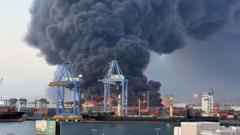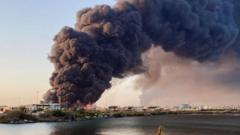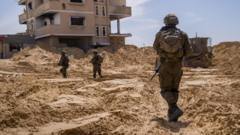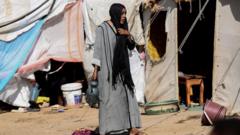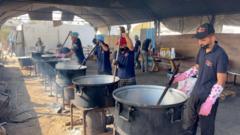As tensions rise in Sudan’s ongoing civil war, the government has severed diplomatic ties with the United Arab Emirates following allegations of Emirati support for the paramilitary Rapid Support Forces (RSF).
Sudan Terminates Diplomatic Relations with UAE Amidst Civil War Claims
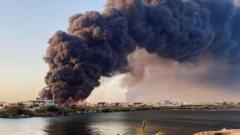
Sudan Terminates Diplomatic Relations with UAE Amidst Civil War Claims
Sudan accuses UAE of supporting rival forces as conflict escalates in Port Sudan.
Sudan's Defence Minister Yassin Ibrahim disclosed the break in relations following a series of aerial strikes targeting strategic locations in Port Sudan. The strikes, which began on Sunday and continued for three days, have turned the formerly secure city into a battleground, further complicating the humanitarian crisis plaguing the nation. Ibrahim specifically pointed to the UAE’s alleged support for the RSF, a claim that the UAE has repeatedly denied, insisting it does not provide any assistance to the group.
In response to these tensions, Sudan announced the withdrawal of its ambassador from the UAE and the closing of its diplomatic missions. The situation has intensified with drone strikes targeting the international airport, a power station, and a hotel in Port Sudan, a city that had previously remained relatively safe during the ongoing conflict. The Sudanese army claimed to have thwarted an attack on its largest naval base, using anti-aircraft missiles to intercept the drones.
Internationally, conflicts involving Sudan have drawn attention, with both the UK and the US urging nations to cease their support for the warring factions. In a significant legal blow to Sudan, the International Court of Justice dismissed its case against the UAE regarding complicity in genocide, citing the UAE’s opt-out from Article 9 of the Genocide Convention. The UAE’s Deputy Assistant Minister for Political Affairs urged the global community to prioritize humanitarian efforts to assist Sudanese citizens amid the ongoing violence.
Despite the continuing accusations of war crimes against both the Sudanese army and the RSF, the conflict in Sudan remains a focal point of international concern as the humanitarian crisis continues to deepen.
As the situation develops, the need for a unified international response grows increasingly critical.
(Additional reporting by Cecilia Macaulay)
In response to these tensions, Sudan announced the withdrawal of its ambassador from the UAE and the closing of its diplomatic missions. The situation has intensified with drone strikes targeting the international airport, a power station, and a hotel in Port Sudan, a city that had previously remained relatively safe during the ongoing conflict. The Sudanese army claimed to have thwarted an attack on its largest naval base, using anti-aircraft missiles to intercept the drones.
Internationally, conflicts involving Sudan have drawn attention, with both the UK and the US urging nations to cease their support for the warring factions. In a significant legal blow to Sudan, the International Court of Justice dismissed its case against the UAE regarding complicity in genocide, citing the UAE’s opt-out from Article 9 of the Genocide Convention. The UAE’s Deputy Assistant Minister for Political Affairs urged the global community to prioritize humanitarian efforts to assist Sudanese citizens amid the ongoing violence.
Despite the continuing accusations of war crimes against both the Sudanese army and the RSF, the conflict in Sudan remains a focal point of international concern as the humanitarian crisis continues to deepen.
As the situation develops, the need for a unified international response grows increasingly critical.
(Additional reporting by Cecilia Macaulay)





